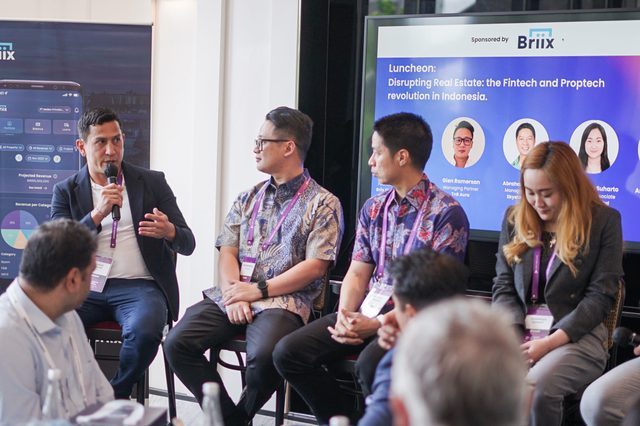Partner content in association with
Indonesia needs startups that work at the intersection of proptech and fintech
(Left to Right): Conrad Warren, founder and co-chairman, Briix Financial Technology; Glen Ramersan, managing partner, TNB Aura; Abraham Hidayat, managing partner, Skystar Capital; and Anastasya Suharto, Investment Associate, Indogen Capital, Angus Mackintosh, Consulting Editor, DealStreetAsia at the Indonesia PE-VC Summit 2024 in Jakarta.
Despite the considerable number of startups in Indonesia’s property sector, the market is still waiting for a proptech company that can make notable strides on the financial aspects of the property industry, say investors.
Even as there are startups in Indonesia such as Briix Financial Technology, a proptech player that is venturing deeper into fintech, they are few in number.
“Until now there have been no big ‘proptech-slash-fintech’ players that have emerged and cracked it,” said Abraham Hidayat, managing partner, Skystar Capital, at a luncheon panel discussion titled ‘Fintech Meets Proptech: Reshaping Indonesia’s Property Landscape’ at the Indonesia PE-VC Summit 2024 in Jakarta on January 25.
Hidayat, whose firm is a sector-agnostic investor, compares Indonesia’s property landscape to the automotive space, given that both sectors saw initial tech disruption in the form of online listing portals.
While startups like Carro, which is a portfolio firm of Skystar, and its competitor Carsome, started off with automotive listings, they swiftly expanded into adjacent areas like automobile leasing and financing. On the other hand, their proptech counterparts have not diversified in the same way and many have chosen to stick to the listings model.
This strategy does not seem to be sustainable, Hidayat added, pointing to the shutdown of PropertyGuru-owned Rumah.com, which was among the market leaders, in August last year. Prior to that, there was consolidation in the space, with the acquisition of OLX’s property unit by Lamudi Indonesia and the buyout of Rumah123 by Singapore’s 99 Group.
Hidayat was joined in the panel by TNB Aura managing partner Glen Ramersan; Anastasya Suharto, Investment Associate, Indogen Capital; and Conrad Warren, the founder and co-chairman of Briix Financial Technology.
According to Ramersan, moving into transactions, and effectively into fintech, would be a tall ask for listing portals as “selling properties is a human relationship business”, which is difficult to automate using technology.
Ramersan, the former co-founder and CEO of proptech startup RoomMe, joined TNB Aura in March 2023 to strengthen the firm’s activities in Indonesia.

Briix eyeing best of both worlds
To fill the proptech-fintech void and move closer to property transactions, a few players have emerged in the market attempting to simplify the fragmented mortgage process. While most of these platforms are helpful for home buyers, a lot of them are merely funnelling products from traditional banks and are therefore “not fit for purpose for the current market,” said Ramersan.
However, one startup that appears to be venturing deeper into fintech is Briix. The company is the first regulated non-bank mortgage provider in Indonesia that combines proptech and fintech in one platform.
Registered under the country’s financial services authority (OJK), Briix is able to offer mortgage and property project loans from its own balance sheet, in addition to its property marketplace and management offerings.
“When we started, we operated as both a fintech and proptech company,” said Briix founder and co-chairman Conrad Warren in the panel. “Now in our fourth year, we have essentially split them into two businesses. The proptech business essentially underwrites the operational risks…the fintech business is our loans business which deploys the loans to the proptech customers.”
In essence, Briix aims to make the property investment process more streamlined and transparent through technology. Currently focused on properties in Bali and its surrounding islands, the company enables investors to not only discover and manage properties, but also buy them on a single platform, with accompanying mortgage financing.
“The payment system in Indonesia has got a lot of work to do but there are payment solutions for it. Through Briix, you can pay for your architect, pay for your construction company, pay your taxes and everything through that one account.” added Warren, whose company has secured $124 million in projects to date.
Briix has been able to expand relatively quickly by employing a wholesale model of providing project financing. The role out of the retail model will be the next stage. Combining the marketplace model and transactions, with financing and property management, gives it multiple revenue streams, making it more financially sustainable.

Big problems to be solved
While investments in the proptech space have slowed in the past year, the investors in the panel said VCs are still keen to invest in promising proptech startups.
Mandiri Capital, for instance, recently launched a joint property-related fund with local lender BTN, which looks to invest in proptech, mortgage tech, construction tech and other verticals in the property sector. Other existing funds are also on the lookout for startups solving key problems in the space.
The VCs agree that there are still many the key problems to tackle in the property sector, such as like second charge financing, or a second loan given to property owners for renovation and expansion, which is a product not often effectively provided by banks.
However, whatever entry point players choose to take on, it is imperative that they eventually expand their offerings to ensure that their business can be sustainable.
“Players should capture the opportunity from end to end by helping buyers identify which property to acquire, list it, and also partner with fintech companies for financing. That would be a good way to diversify your revenue and increase transaction volumes, which would sustain the business further,” said Anastasya Suharto of Indogen Capital at the panel.
For Briix, diversification of revenue is something it has enjoyed from the very start of its operation, given the nature of its original business.
As a company that started out by helping Australian investors invest in Indonesian properties, Briix has learned to develop numerous services for clients such as asset identification, evaluation, and counterparty selection.
Through its array of solutions, Briix hopes it can play its part in taking Indonesia’s proptech, as well as fintech, to the next level.
“As Indonesia’s first integrated and regulated mortgage provider and fintech platform, we are committed to solving the fundamental problems that currently prohibit our users from accessing competitive financing and property management solutions. We provide the platform required to analyse and transact high-quality investment properties in a safe, efficient and regulated digital environment. Our users are also provided with the tools required to monitor and manage their property portfolio in real-time, to a level of detail previously inaccessible to individual property investors. By consolidating all of these services via our user-friendly and proprietary technology, Briix continuously evolves our service quality which leads to greater transparency, increased profitability, and easier access to finance.” said Briix’s Warren.

